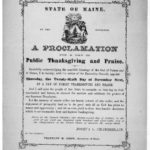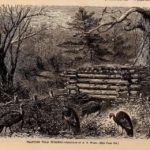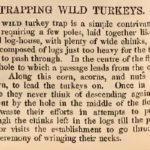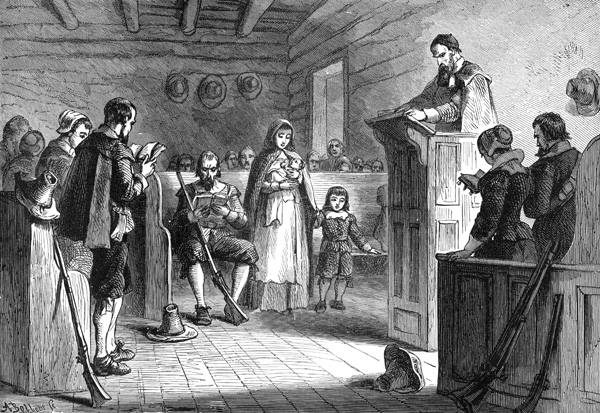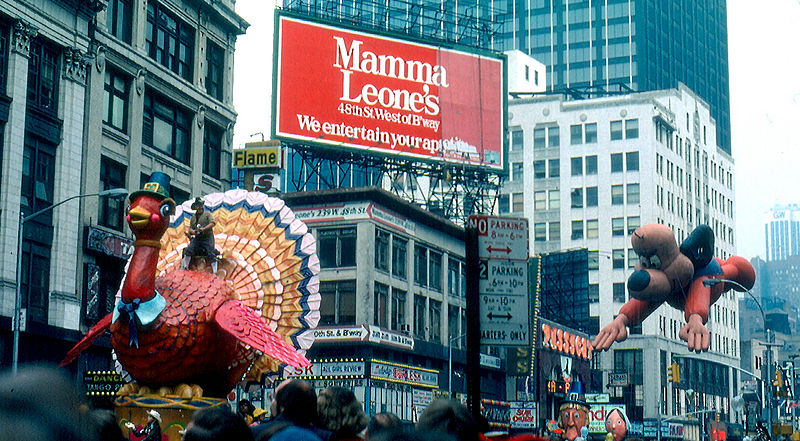In October 1868 President Andrew Johnson proclaimed a national day of Thanksgiving on November 26th, the last Thursday of the month. This continued a tradition begun five years earlier by Abraham Lincoln.
In its November 28, 1868 issue Harper’s Weekly thought the day should focus less on church and more on the home:
THANKSGIVING.
THERE are not many dies fasti with us Americans. How nations and times differ in this regard! The ancients, owing to their love of outward show, had frequent festivals; and the same is true of the more barbarous races of the present time. Thus among the Abyssinians two-thirds of the days of the year are festival days. The progress of civilization has a tendency toward the elimination of these days from the calendar. This is to be accounted for partly by the fact that life, as regulated by civilization, is forever growing busier and more[?] intense; as men depart from their primitive modes of living they have less leisure, they live more and more “by their wits,” and find that the necessities of such a life occupy nearly all their time. Besides, the cultivated intellect looks rather to the inherent[?] significance of life, and therefore devotes less attention to outward show; it rejects feast-days and processions; and thus it is that the earnestness of modern thought has discarded most of those external manifestations without which the life of the barbarian would be insufferably dull and tedious. Not that modern life is less of a drama; on the contrary, it is a subtler and intenser drama, more significant and more profound.
Civilization develops home life, and reserves for that the greatest and best of its powers. Our two great festivals – Thanksgiving and Christmas – are home-festivals. The former is national, it is true, and the latter is religious; but while they are thus connected in our thoughts with our common country and our common faith, while they are bonds of social union and harmony, still they are celebrated by families, and find their natural centre in our hearth-stones.
Hence the memorable feature of Thanksgiving Day is not the sermon but the dinner. This festival is preserved not for its outdoor show but for its private sacredness. If our artists had prepared for our readers a sketch representing a congregation listening to a Thanksgiving sermon instead of the characteristic pictures on pages 760 and 761, nobody would take the trouble to look at it. But who will not be touched by our illustration representing a family at the market purchasing their Thanksgiving dinner? We almost go through the whole scene in our imaginations. We hear the market-man praising his nice fat turkeys as if they were his pets; we see the serious face of the good-wife, who is counting the cost and calculating how far the contents of her purse will go, and we congratulate the wisely silent husband, who regards his wife with a deferential look that seems to say: “Everything depends upon you, my love.” Truly has Mr. EHNINGER portrayed this interesting group; and not less characteristic is Mr. JEWETT’S illustration on the opposite page. It is “The first Thanksgiving Dinner” of a poor little girl who has been called in from the cold street to feel the delicious warmth of a home such as she never has had, and to taste dishes and dainties never tasted before. Those who called her in do not fully appreciate the situation; it is with them a common affair – but to the little wanderer it seems like a bit of heaven!
Oh, if we only knew what charity really means – what really is the pith of our Christianity – then indeed there would be happier hearts all the world over, and not only Thanksgiving Day but all the days of the year would be crowned with the love of Christ.
And clergymen were also preaching on Thanksgiving Day. Just like eight years earlier Henry Ward Beecher delivered a discourse at Plymouth Church in Brooklyn. Unlike 1860 The Union had won the war and slavery was officially outlawed in the United States. Reverend Beecher didn’t have to demand that his congregation choose between the barbaric South and the civilized North; instead, according to a report in the November 27, 1868 issue of The New-York Times he also seemed to focus mostly on the household. The article summarized Reverend Beecher’s sermon:… Thanksgiving was a New-England holiday. New-England then blended the Hebrew and the Greek character. In its intense individualism, its deep moral force and its household life it is preëminently Jewish. In ts admiration of metaphysics, its deification of argument and its worship of ideas, it is preëminently Greek. New-England is not Greek in its taste and love of beauty, but it is in its passion for reason … The development that is yet to come in Northern social life is in joyousness, and, as I think, the joyousness of home life. The family, always rich in social virtues, is to become yet richer. The civilizing centre of modern America must be home and the family circle. Thanksgiving is the day of nature, of the harvest, the field, of the household and the home. It is the one great festival of American life that pivots on the household. The Hebrews, like the Yankees, knew how near the virtues lay to the stomach. [Laughter.] The various national customs introduced here by immigrants from abroad were likely to enrich the American household. The Northern races are the races of domestic and home habits. There is little idea of family in Spain, still less in Italy. … It may almost be said that the frost line marks the realm of republics. True Republican commonwealths grow out the power that is generated in the household. … The increasing intelligence of women is to contribute largely to … [a richer household in America]. It is in vain that people cry out against what are called “woman’s rights.” Her social life commenced at zero and has been steadily advancing, adding at step to the well being of society. Albeit, every step of her advancement was supposed at the time it was taken, to be a deviation from “propriety.” … The next step in woman’s advancement will be suffrage. A citizen at the present day without a vote is like a smith without a hammer. Women will never “unsex” themselves, or become men by their external occupations. God’s colors don’t wash out, and sex is dyed in the wool. Those who are most afraid that women will become men, I have always noticed, are they who are themselves the nearest like women. It is a kind of latent rivalry. [Laughter.] Weakness is not a woman’s charm. … Let us not be afraid of taking down barriers, and saying to every human being, “do what is right – what God has given you the ability and power to do well.” In the future we shall have stronger and purer households. The “frailty of the fair sex” will cease to be a theme for deriding poets, when women learn that strength is feminine. While we have little to fear from these supposed dangers, there are real dangers which we should fear. These are extravagance and luxury, self-indulgence and ostentation. The yearning for approbation incites women to these vices. Were she made freer, better employed and better educated, she would be satisfied, and would find her happiness in more rational things. … [more on marriage and the family] But he had detained them too long – the odor of the coming feast fills the air. Go then and remember God’s bounty throughout the year. Give the day to thanks, to joy, to gratitude, and remember amid your feastings to forgive your enemies, purify your hearts and augment your charities to the poor and destitute.
And now let us sing, and it shall be “America” of course, and all who cannot sing let them make a joyful sound.

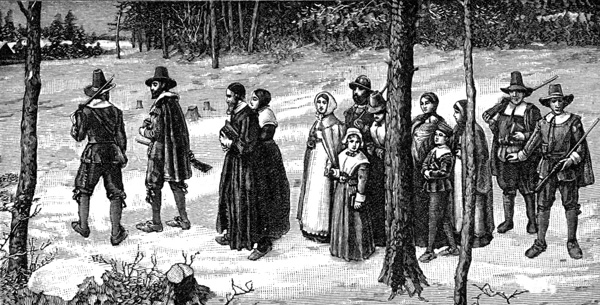
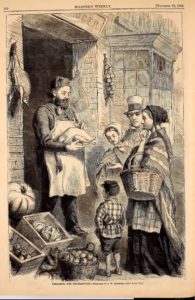
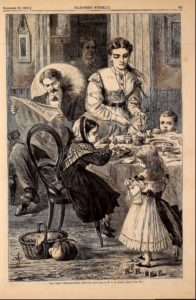
![Plymouth Church,--Rev. Henry Ward Beecher, Orange Street, Brooklyn / Stacy 691 B'way. ([New York City, N.Y.] : [George Stacy], [1863] ; LOC: https://www.loc.gov/item/2016653293/)](https://www.bluegrayreview.com/wp-content/uploads/2018/11/51455v-197x300.jpg)
